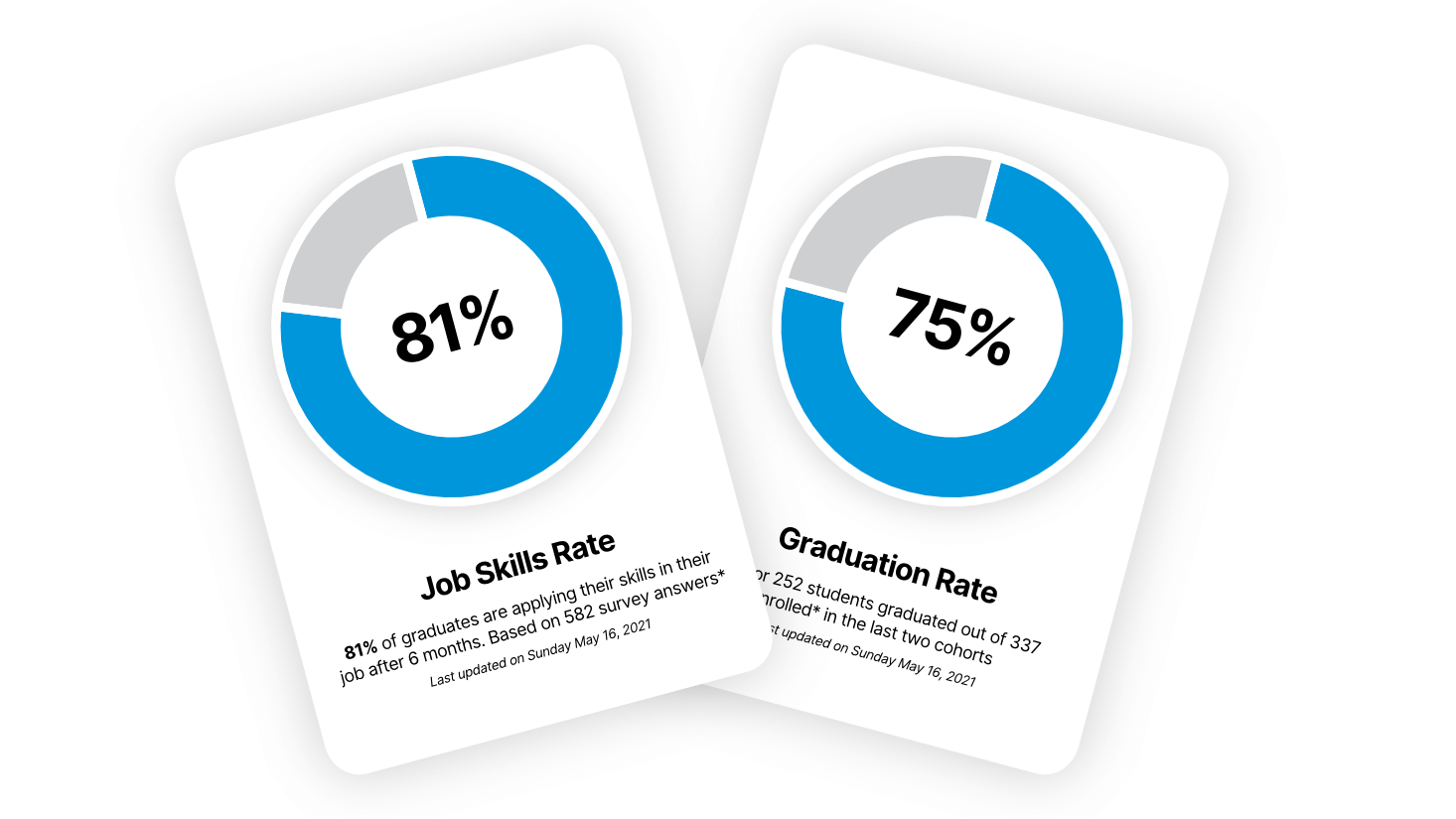Nucamp’s Job Skills Transparent and Realistic Outcome Norm (TRON)
Last Updated: January 8th 2023

Ever since its inception in 2017 Nucamp has been synonymous with affordability and high-quality coding education within the industry. Thousands of students and graduates have shared their thoughts and 5-star ratings, not just online, but with their friends, family, and social connections, making Nucamp one of the fastest-growing coding bootcamps.
Like many other coding bootcamps we had to face this reality: reporting accurate job placement data is harder than you think.
It's a project of its own performed annually across the industry: gather the list of enrolled students, graduates, figure out a way to know if they are employed in the field or not (survey? LinkedIn profile?), then decide how to handle students who started with their cohorts but decided to pause, and those who just finished pausing and graduated. Create the "after 3 months" audience, the "after 6 months" audience, the "after 9 months" audience and run the process for each. Decide what to do when a graduate did report getting a new job after 3 months, but not anymore after 6 months, or 9 months. And what about students who seem to be reporting monthly compensation or hourly rate when asked for their yearly compensation... ask for the hourly rate and extrapolate? Would that be accurate? Hmmm.
Not only is it complicated, it is also extremely controversial. It's opaque. Some job placement data advertised are just too good to be true. And some - sometimes the same ones - are even exposing their incorrect math (to the curious eye).
And so what did Nucamp do? Like we have done in the past: think about the problem from the ground up, and aim to do better. There are too many outside factors that determine true job placement rates, so we don't measure that. Instead, we measure Job Skills Rate—are students using the skills they've learned in their paid work? Then we build the right survey. Wire in all the processing rules. Then automate the heck out of it. So that every 3 months and up to a year, every graduate receives a survey and several reminders, and their answers are entered directly into our system. And every day a cron routine reads all the answers, processes the result, and stores the calculated data.
And so today we are proud to announce a new trustworthy and transparent methodology to present job skills data to aspiring developers.
- A simple formula to count job skills rate: the metric is based on our graduates responding to an employment survey every 3 months for a 12-month period. We are not filtering the results based on obscure rules like for example “graduates who have participated in our career services…”, which are often used in the industry to alter the results. We look at the answers to 2 simple questions to establish job skills rate: 1) Are you employed? 2) Are you applying your coding skills? Applying your tech skills can be in your current or new job, or on a side project (i.e. freelancing on the side). As long as the skills you've learned with Nucamp are useful to your job.
- Job skills data is updated daily: this means we are not using old data, ever. Too often job placement data advertised in the industry is several years old, and not a reflection of the current coding bootcamp performance. And not only are we updating our job skills data daily, we are also storing it monthly to allow aspiring developers to review our historical performance, month by month.
- Completion rate is shared along with job skills rate: because too often coding schools have an incentive to drop under-performing students, denying them an opportunity to succeed. In one well-documented example on our blog, one coding bootcamp advertises an 84% job placement rate…while 82% of their students withdrew or dropped out. Our graduation data is based on students who completed the first module of their bootcamp. We believe it's fair since Nucamp doesn't have admission, this is a way for us to acknowledge that students can try our program and drop out if they realize it's not for them.
- We are counting every graduate’s survey answer, from the beginning of time: not just from one specific cohort, or a pseudo sample of our graduate population. Another common practice in the industry is to select a specific cohort of students that is expected to perform well. For example, a cohort of students where more than 60% have bachelor’s degrees will be selected to advertise outcomes.
As a result, Nucamp job skills data is posted and updated daily at this location: https://www.nucamp.co/careerservices
Ludo.
Nucamp Founder and CEO.
Ludo Fourrage
Founder and CEO
Ludovic (Ludo) Fourrage is an education industry veteran, named in 2017 as a Learning Technology Leader by Training Magazine. Before founding Nucamp, Ludo spent 18 years at Microsoft where he led innovation in the learning space. As the Senior Director of Digital Learning at this same company, Ludo led the development of the first of its kind 'YouTube for the Enterprise'. More recently, he delivered one of the most successful Corporate MOOC programs in partnership with top business schools and consulting organizations, i.e. INSEAD, Wharton, London Business School, and Accenture, to name a few. With the belief that the right education for everyone is an achievable goal, Ludo leads the nucamp team in the quest to make quality education accessible
